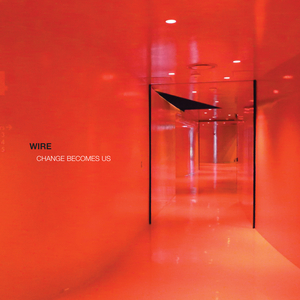Wire, "Change Becomes Us"
 Nostalgia, and catering to it, can be a dangerous thing. There are of course exceptions, such as the recent Swans tours and albums and Wire's own reappearance in the early part of the 2000s, but too often it is fraught with artists clinging shamefully to old glories with little artistic merit. Which is one of the things that makes this ostensibly new Wire album somewhat hard to peg down. Building upon material that was previously performed live, but overall unfinished from the post-154, pre-first breakup era, Change Becomes Us builds itself upon these and puts a Bruce Gilbert-less sheen to everything, with mixed results.
Nostalgia, and catering to it, can be a dangerous thing. There are of course exceptions, such as the recent Swans tours and albums and Wire's own reappearance in the early part of the 2000s, but too often it is fraught with artists clinging shamefully to old glories with little artistic merit. Which is one of the things that makes this ostensibly new Wire album somewhat hard to peg down. Building upon material that was previously performed live, but overall unfinished from the post-154, pre-first breakup era, Change Becomes Us builds itself upon these and puts a Bruce Gilbert-less sheen to everything, with mixed results.
First, and what I find the most difficult part of this album to swallow is that this is not unheard material:everything on here is based upon reworks of material captured on Document and Eyewitness and its sister compilation, Turns and Strokes.Personally, I have sat with those albums for the better part of a decade and a half, and I know many others have much more experience with them, and thus those unfinished, rough, and poorly recorded versions feel like the "right" ones to me.The idea of revising and polishing them as newer material is somewhat troublesome.
When everything comes together, the results are of the same quality I would expect from Wire:"Doubles and Trebles" tweaks "Ally in Exile" (which also inspired "I Don't Understand") with more complexity and some of the acoustic guitar sound Colin Newman brought on board with Red Barked Tree, but keeps some ugly distortion in as well, retaining the espionage tinged tension of the original.The same goes for "Stealth of a Stork," which works in material from "Witness to the Fact," but keeping that nasty, spiky edge amidst the cleaner studio tweaking.
An example where things fall flat, however, would be "Re-Invent Your Second Wheel," which superficially has a light, floaty sound akin to most of A Bell Is A Cup, complete with some of Graham Lewis' more affected vocals.As a stand alone composition, it would probably be acceptable, but not outstanding.Knowing this is based upon the bizarre neo-tribal Dadaist "Zegk Hoqp" just makes everything seem wrong in comparison.The odd call and response chants and sloppy polyrhythms (which included the members of DAF on Document and Eyewitness as percussionists) are reduced to a light, unobtrusive pop number.
The other troubling facet of this album is that it continues to have such a pop leaning that it starts to blur the lines between a Wire album and a Colin Newman project.Bruce Gilbert always kept things weird (in the best possible way), and as the band continues more and more without his input, this lack of difficulty becomes more pronounced."Keep Exhaling" (originally "Relationship") could be culled from a Newman solo work, and "Time Lock Fog" works for what it is, but makes me crave the dissonance of "5/10," from which it was spawned.
That is not to say that this lighter pop feel is always a bad thing, however."B/W Silence" works well as an ethereal influenced piece, based upon the live version of "Lorries" that already had that sensibility to it."Magic Bullet" also, previously heard in an abysmally lo-fi form as "Over My Head" balances the melodic and the ugly quite well.
Something like "Eels Sang" sits in a grey area for me that I am still not entirely sure how I feel about it.The overall feel is faithful and consistent with the live take, but it just feels so different without Lewis' exasperated vocals and the beautifully harsh horn blasts.The same applies to "Love Bends", which as a stand alone song would be quite excellent as a bit of intentionally overblown pop, but the fact that it borrows from the deliriously unhinged "Piano Tuner" leaves things somewhat questionable.
I know how awful it is to end a review without a definitive opinion, but to be honest I simply have not been able to form a specific one for Change Becomes Us, which I suppose is a conclusion unto itself.Had I no familiarity with the nascent, disjointed material this was borne from, I would definitely be fond of it, although I would probably still feel that it is a bit less difficult and challenging than the best Wire albums.But with the fact that it is based on material I have heard so many times over the years, my opinion ends up tainted by feelings of how things "should" sound in their original form.As I said, nostalgia can be a dangerous thing.
samples:
 



